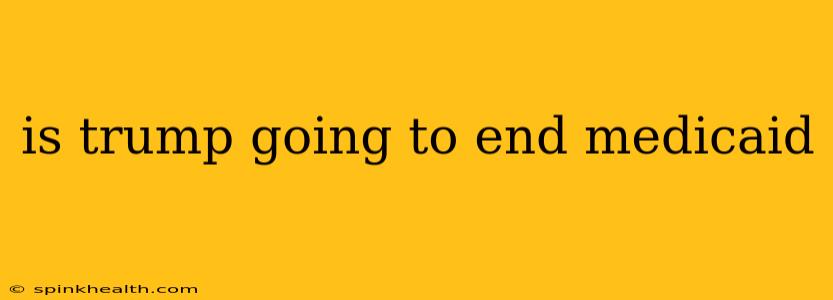Is Trump Going to End Medicaid? Unpacking the Complexities
The question of whether Donald Trump would end Medicaid is a complex one, steeped in political rhetoric and shifting policy proposals. It's not a simple yes or no answer, and understanding the nuances requires delving into his past actions and statements. While he never explicitly called for a complete elimination of Medicaid, his proposed changes sparked significant concern and debate.
Let's unravel this by addressing some frequently asked questions surrounding this topic.
What were Trump's proposed changes to Medicaid?
During his presidency, Trump's administration repeatedly attempted to reshape the Medicaid system. The most significant effort was the push for block grants. This proposed system would have shifted the funding mechanism from a largely open-ended federal matching system to fixed, per-state block grants. The idea was to give states more control over their Medicaid programs. However, critics argued that this would lead to cuts in coverage and benefits, disproportionately affecting vulnerable populations. These efforts ultimately faced significant opposition and were largely unsuccessful in Congress.
Did Trump attempt to reduce Medicaid funding?
While not outright ending Medicaid, the Trump administration's actions certainly aimed to reduce federal spending on the program. Besides the block grant proposals, there were numerous attempts to alter eligibility requirements and limit the scope of benefits. These efforts were frequently met with strong resistance from Democrats and even some Republicans, highlighting the politically charged nature of this issue. The administration's budget proposals consistently sought reductions in Medicaid funding, though Congress often rejected these proposals.
What is the current status of Medicaid?
Medicaid continues to exist as a federal and state program. It hasn't been abolished. However, the ongoing debate about its future underscores the continued tension between proponents of significant reform and those advocating for its preservation in its current form. The fluctuating political landscape will continue to influence the program's shape and funding.
How did Trump's policies impact Medicaid?
While Trump's attempts to drastically overhaul Medicaid failed to pass Congress, his administration did influence Medicaid indirectly. Changes to the Affordable Care Act (ACA), including weakening of the individual mandate, resulted in fewer individuals enrolling in the ACA marketplace, which in turn impacted Medicaid expansion populations. This had a ripple effect on Medicaid rolls in some states, although the impact was complex and varied from state to state.
What are the arguments for and against changing Medicaid?
The arguments surrounding Medicaid reform are deeply rooted in ideological differences. Supporters of reform often emphasize fiscal responsibility, arguing that the program is unsustainable in its current form. They propose increased state control and greater efficiency as solutions. Conversely, opponents express concern about the potential for cuts to crucial healthcare services for millions of low-income Americans, children, seniors, and individuals with disabilities. They argue that Medicaid is a vital safety net and that significant changes would have devastating consequences.
Conclusion: A nuanced reality
The narrative surrounding Donald Trump and Medicaid is more complex than a simple "end" or "no end" answer. His administration consistently attempted to reshape the program through various proposals, primarily focusing on shifting funding mechanisms and limiting spending. While these efforts faced significant opposition and failed to eliminate the program, they fundamentally altered the conversation around Medicaid's future and left an undeniable impact on its trajectory. The ongoing debate highlights the deep-seated political divisions and the significant challenges in navigating the complexities of a vital social safety net program like Medicaid.

